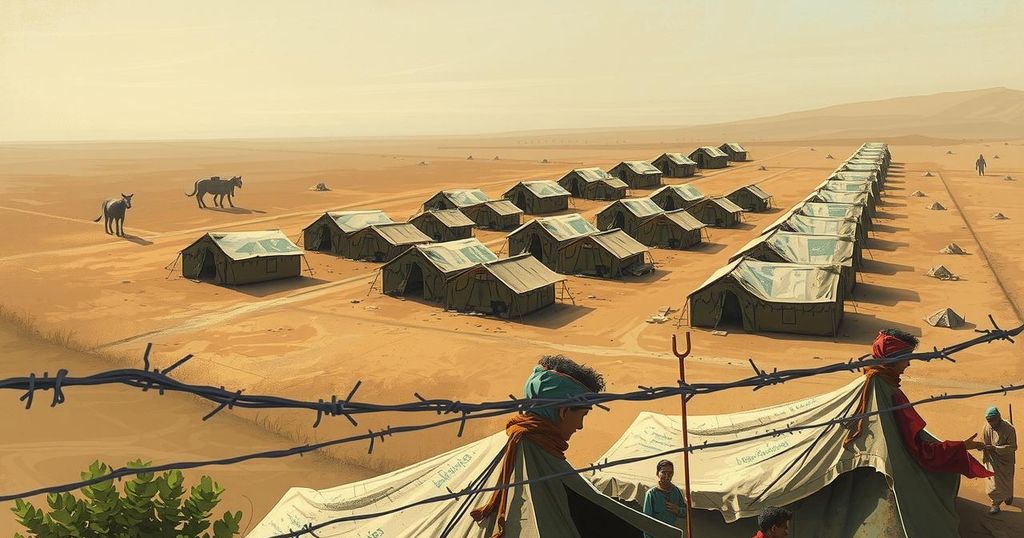UN Reports Critical Conditions for Sudanese Refugees in Libya

The UN warns that over 200,000 Sudanese refugees in Libya face human rights abuses, emphasizing the urgent need for international support. Following the onset of conflict in Sudan, many refugees arrive without documentation, leading to severe legal repercussions. While conditions are somewhat better in Northern Libya, the journey to safety remains fraught with dangers, including detention and human trafficking. Advocacy for refugees and humanitarian assistance is critical to address the situation.
The United Nations has raised significant alarms regarding the plight of over 200,000 Sudanese refugees who have fled to Libya amidst ongoing conflict in Sudan. These individuals face numerous human rights violations and lack a viable path forward. The UN Refugee Agency (UNHCR) reported that since the conflict erupted in April 2023 between the Sudanese army and the Rapid Support Forces (RSF), ten million have been displaced, with about two million seeking asylum in neighboring nations. Libya’s conditions, however, are increasingly dire for these refugees.
As of January 2025, approximately 210,000 Sudanese refugees reside in Libya, many arriving without identity documentation, leading to immediate arrests and detentions under Libyan law. A lawyer from southern Libya, who preferred anonymity, noted the challenges these refugees encounter, as approximately 400 to 500 arrive daily, often confronting various human rights abuses in detention centers. The UNHCR reports that these refugees encounter arbitrary arrests, extortion, and violence despite international law guaranteeing their protection.
Libya remains marred by internal strife since the NATO-backed revolution in 2011, complicating its governance and human rights situation. With two rival governments and numerous armed factions, these tumultuous conditions allow for rampant human rights abuses. Though Libya is bound by an African Union agreement, it has not ratified the 1951 UN Refugee Convention, thus unable to uphold refugee rights adequately.
Lawyers like Omar assist detained Sudanese refugees by navigating legal fines for their release and advocating against prolonged detention. Some refugees languish in detention facilities for years without trial. Challenges escalate for Sudanese individuals, particularly children, who experience homelessness and are vulnerable to forced labor and trafficking.
Conversely, in Northern Libya, particularly in Tripoli, conditions for refugees improve somewhat, as they can register with the UNHCR, allowing hope for a safer future through resettlement. Nonetheless, very few refugees experience this transition, with just 450 having been resettled in Germany recently. The UNHCR estimates that, between early 2023 and April 2024, around 6,000 Sudanese crossed into Italy, indicating a desperate push towards Europe.
For many Sudanese refugees, the Mediterranean Sea poses dangers, including interception by the Libyan Coast Guard and forced returns. The UN High Commissioner for Refugees, Filippo Grandi, emphasized a growing concern for these individuals who might migrate in search of safety if external support does not materialize. The European Union’s financial backing of the Libyan coastguard, totaling at least €59 million since 2017, has intensified the risks for these individuals, often leading to detention and abuse once returned to Libya.
Human rights organizations such as LAN continue to document the violations faced by refugees and exert pressure on Libyan authorities for reform. In alarming findings, mass graves have been discovered, highlighting the tragic outcomes facing those seeking refuge. The UNHCR continues to push for enhanced protection measures to rebuild lives effectively and provide humanitarian assistance along perilous migration routes. This situation remains complex, requiring robust international attention and intervention to safeguard the rights and safety of Sudanese refugees in Libya and beyond.
The situation for Sudanese refugees in Libya is critical, marked by severe human rights violations and a lack of basic protections. As over 200,000 refugees navigate a perilous existence, their plight underscores the need for international intervention and support. The UNHCR’s efforts to advocate for these individuals’ rights remain vital, emphasizing the necessity for resettlement opportunities and humanitarian assistance against the backdrop of ongoing destabilization and conflict.
Original Source: www.swissinfo.ch








